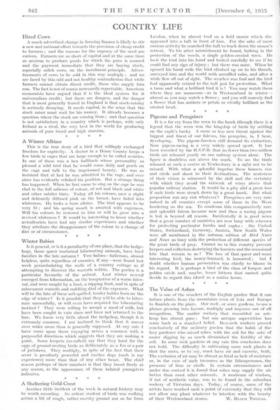Winter Babies
Is it general, or is it a peculiarity of one place, that the hedge- hogs, those queer nocturnal hibernating animals, have bred families in the late autumn ? Two babies—ludicrous, almost helpless, quite regardless of enemies, if any—were found last week perambulating the walls of a country cottage as, if attempting to discover the warmth within. The garden is a particular favourite of the animal.
Last winter several emerged from hibernation, on the temptation of a warm, inter- val, and were caught by a frost, a nipping frost,, and in spite of subsequent warmth and coddling died of the exposure. What will be the fate of these soft-quilled, tenderbabies born on the edge of winter? Is it possible that they will be able to hiber- nate successfully, or will even have acquired the hibernating instinct '? They were willing to accept a meal of milk, but have been sought in vain since and have not-returned to the lure. We know very little about the hedgehog, though, it is extremely common. I ant inclined to think that it moves over wider areas than is generally supposed. At any rate I have come upon, them voyaging across a common with a purposeful directness which suggests that they are making a point. Some keepers (so-called) say that they hunt for the eggs of ground-nesting birds as deliberately as a fox or a pair of jackdaws, They multiply, in spite of the fact that their scent is peculiarly powerful and excites dogs (such is my experience) more than that of any other beast. The chief reason perhaps of their numbers is that they breed freely at any season, as the appearance of these belated youngsters indicates.












































 Previous page
Previous page